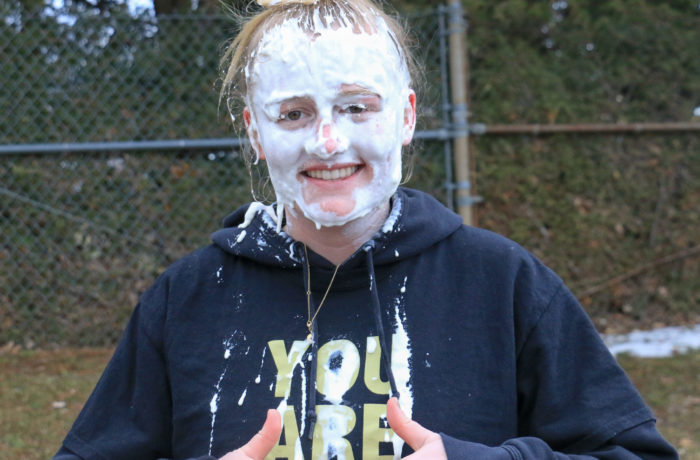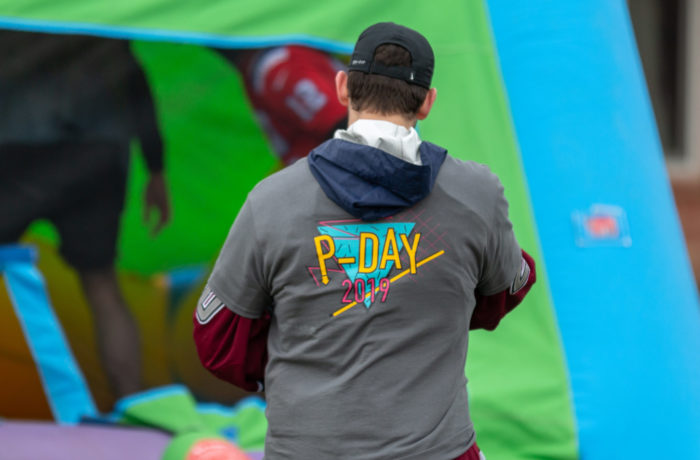 NPR Pentagon correspondent, Tom Bowman ’77, traveled from his office in Washington, D.C. to speak to the St. Michael’s community on Thursday, Feb. 23 about his experiences as a journalist covering the Iraq and Afghanistan War. Before taking the stage in McCarthy for a panel discussion with two student veterans, Bowman took time to sit down with The Defender to describe his journey. He wore a black coat, jeans, shiny shoes — and had two sets of glasses placed on the table beside his right arm. One pair for reading, the others tinted black to block the sun.
NPR Pentagon correspondent, Tom Bowman ’77, traveled from his office in Washington, D.C. to speak to the St. Michael’s community on Thursday, Feb. 23 about his experiences as a journalist covering the Iraq and Afghanistan War. Before taking the stage in McCarthy for a panel discussion with two student veterans, Bowman took time to sit down with The Defender to describe his journey. He wore a black coat, jeans, shiny shoes — and had two sets of glasses placed on the table beside his right arm. One pair for reading, the others tinted black to block the sun.
Bowman graduated from St. Michael’s College with a degree in history and then earned his masters degree in American studies from Boston College. He transitioned to his current position as a NPR Pentagon Correspondent with minimal experience in radio broadcast. “You’re talking into this mic and you’re talking to like 26 billion people, so it’s really nerve wracking at first,” but he soon found his style as a radio broadcaster. He said, “you want to give answers that are not too long, and not too short — thinking about how to collaborate your information without making it drone on, almost like you’re looking for that happy medium.”
Last summer while reporting for NPR in Afghanistan, Bowman lost two colleagues in an ambush attack by the Taliban. In this interview the readers receive the inside scoop from a Pentagon reporter who reports on the atrocities of warfare during one of the most divided times in U.S history.
Q: On a normal day, how would you go about reporting while in Afghanistan?
A: Well we would start like a month or two out, like where do we wanna go? And who do we want to go with? Usually, we were imbedded with the military, so we would go around on patrols and talk with them, ask what’s going on. The Afghans would be with me as well, so we would have a translator.
Q: What was the intention of going to Afghanistan in the first place?
A: The terrorism over there was getting worse, and the Taliban was gaining more territory. We wanted to see if the Afghan military was doing what they were supposed to. One soldier we were talking to told us they cleared the roads, so I asked them to show me — I wanted proof that they had actually done it. Ironically, this is when we went under attack.
Q: So you’re right in the middle of live combat?
A: Right, and last year, we had a pretty bad incident — we lost two of our friends. We were on a patrol and were attacked by the Taliban — my photographer was killed and our translator too. We had been shot at a number of times, but this was bad. There were three vehicles in our convoy — we were in the lead vehicle with an Afghan general, no other Americans, it was just us and the Afghans. We were driving down this road, when they started taking fire from the left side. The producer I was with, was on her first trip to Afghanistan, and was terrified. I said, I think we’re okay; even though we could hear the sound of bullets bouncing off the side of the amored vehicle. The general we were with goes shooting back with a machine gun, and then we swung around and went back to the base, but by that time we had realized our two colleagues were killed, so that was crazy.
Q: Have you noticed a serious change in the demeanor of the people working at the Pentagon after the recent change in office ?
A: Yeah, I think people are kind of worried about what is going to come. But I think people are kind of happy with the Defence Secretary Jim Mattis — he’s not some strange odd duck — he’s a well known, respected — so I think people are really happy about that.
Q: Do people have heavy weighing political opinions in the Pentagon, or do people try and keep their thoughts to themselves?
A: Yeah, we generally do not talk about it, because we are not supposed to. People you know well will open up to you privately, but they are not supposed to be partisan in anyway.
Q: How did you transition into radio broadcast as a print reporter?
A: I worked for the Baltimore Sun, working there for 19 years. I thought I was going to die a newspaper reporter, but the newspapers kinda died around me. Our editor at the Sun is a legend in Journalism, Bill Marimow, now runs the Philly Inquirer — he won a couple pulitzer prizes. We had ten foreign bureaus and they closed them all to save money, and Bill started complaining about it, so he goes to the staff room and says you’re making too many cuts — they say “Really? You’re fired!” and fired him on the spot. This sent a shockwave through our newsroom and journalism and general — and then NPR picked him up.
Q: Is that how you found your connection with NPR?
A: Right, so a bunch of reporters went over with him immediately, saying we’re out of here, you know? Like if they can fire this guy, they can fire anybody. I said I’m a print guy, I don’t do broadcast. Broadcast is weird, you know, it’s “show buis”. She said to me: don’t worry they’ll teach you how to do it. I asked her to talk to Bill, and if he wants me to come over to talk with him I’ll come over, so she sends me an email the next day saying Bill says come on Wednesday. I get to NPR on Wednesday, walk into his office and Bill said, you’re a finalist for the Pentagon job. I said Bill, this is broadcast — I’m a print guy. He said, don’t worry about it, they’ll teach you how to do it.


